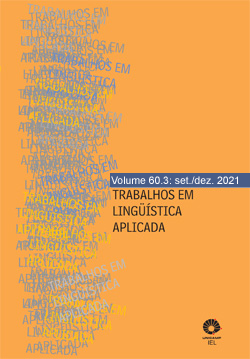Abstract
In this paper we aim to reflect upon the use of literature in English classes focused on teacher education. More specifically, we are interested in answering two main questions, namely: how to provide reading practices in the university which will make it possible for the future teacher to work with the text as a linguistic-discursive materiality, by means of which they will become both a reader and a (future) teacher? And in which ways can the work with the literary text contribute to such a process? In order to do so, we start from the deconstruction of the dichotomies between language/literature and between learn a language/learn to teach a language. Our discussion is limited to some considerations about the curriculum of an English Language Teacher Education Program, in a public university in Minas Gerais State, and also on an experience with literary texts, in a subject aimed at the development of reading in English. Our analyses point out to the fact that, despite changes, the literature curricular proposal still focuses on periodization narrowing the relationship with teaching. The pedagogical proposals of the literary text, in turn, point to possibilities of working a discursive aesthetics-ethics which may affect the constitution of the future teacher by promoting experiences of responsive-responsible meaning making in another language.
References
BAKHTIN, M. (1979). Estética da criação verbal. 3. ed. Trad. Maria Ermantina Galvão. São Paulo: Martins Fontes, 2000.
BRASIL. Ministério da Educação. (2017). Base Nacional Comum Curricular. Versão final. Brasília: Ministério da Educação. Disponível em: http://basenacionalcomum.mec.gov.br/ Acesso em: 30 abril 2020.
BRITO, C. C. P.; GUILHERME, M. F. F. (2017). A constituição do professor de inglês pré-serviço em um curso de Letras EaD: representações sobre formação, ensino-aprendizagem e tecnologia. Linguagem em (Dis)curso, v. 17, n. 1, pp. 117-136.
BRITO, C. C. P.; GUILHERME, M. F. F. (2014). Memorial de aprendizagem e a formação do professor: vozes constitutivas da relação aprender/ensinar línguas estrangeiras. Revista Brasileira de Linguística Aplicada, v. 14, n. 3, pp. 511-532.
BRITO, C. C. P.; HASHIGUTI, S. T. (2019). Produção e avaliação de material didático em um curso de Letras Inglês a distância: sobre a tomada da palavra em LE e um lugar discursivo crítico. Caminhos em Linguística Aplicada, v. 21, n.2, pp. 108-132.
BRITO, C. C. P.; RIBAS, F. C. (2019). “Como se forma um professor de língua inglesa?”: reflexões a partir da reforma curricular de um curso de Letras. Revista Letras Raras, v.8, n. 3, pp. 9-35.
BRUN, M. (2004). (Re)construção identitária no contexto da aprendizagem de línguas estrangeiras. In: MOTA, K; SCHEYERL, D. (Orgs.). Recortes interculturais na sala de aula de línguas estrangeiras. Salvador: EDUFBA, pp. 73-104.
CLÜVER, C. (2014). Inter-textus/inter-artes/inter-media. Aletria: Revista de Estudos de Literatura (UFMG). v. I, n. 14, pp. 11-41.
COMPAGNON, A. (1999). O demônio da teoria: literatura e senso comum. Tradução de Cleonice Paes Barreto Mourão. Belo Horizonte: Ed. UFMG.
ECO, U. (2005). Obra Aberta: forma e indeterminação nas poéticas contemporâneas. São Paulo: Perspectiva.
EAGLETON, T. (1985). Teoria da literatura: uma introdução. Tradução Waltensir Dutra. São Paulo: Martins Fontes.
FRANÇA, T. M. (2019). O ensino de literatura sob a ótica da interface teórica entre a linguística aplicada transgressiva, a Análise do Discurso e os estudos do Círculo de Bakhtin. In: STAFUZZA, G. B.; FONSECA, P. A. (Orgs.). Estudos discursivos em múltiplas perspectivas: discurso, sujeito, sociedade. Campinas, SP: Mercado de Letras, pp. 91-114.
GARCÍA-MARQUEZ, G. (2016). 100 anos de solidão. Rio de Janeiro: Record.
GUILHERME, M. F. F. (2017). Línguas estrangeiras: ensino-aprendizagem e formação política de professores. In: FIGUEIRA-BORGES, G.; SILVA, M. A. (Orgs.) Ensino de línguas em diferentes contextos. Campinas, SP: Pontes Editores, pp. 15- 28.
HALL, G. (2015). Language, Literature and Education. In: Literature in Language Education. 2nd edition. New York: Palgrave Macmillan, pp. 9-98.
ISER, W. (1996). O Ato da Leitura: uma teoria do efeito estético. Tradução de Johannes Kreschmer. São Paulo: Ed. 34.
KUMARAVADIVELU, B. (2003). Integrating language skills. In: Beyond methods: macrostrategies for language teaching. New Haven and London: Yale University Press, pp. 225-238.
LARROSA, J. (2011). Experiência e alteridade em educação. Revista Reflexão e Ação, Santa Cruz do Sul, v. 19, n. 2, pp. 04-27. Disponível em <https://online.unisc.br/seer/index.php/reflex/article/view/2444>. Acesso em: 24 abr. 2020.
LAZAR, G. (1993). Literature and Language Teaching: A guide for teachers and trainers. Cambridge: CUP.
LOPES, L. C. V.; COSTA, M. E. da.; SAMPAIO, M. L. P. (2011). Letramento literário e formação do professor: o ensino de literatura no meio universitário. Entreletras, n. 3, pp. 63-80.
MOTA, F. (2010). Literatura e(m) ensino de língua estrangeira. Fólio - Revista de Letras, v. 2, n.1, pp. 101-111. Disponível em <http://periodicos2.uesb.br/index.php/folio/article/view/3628>. Acesso em: 24 abr. 2020.
NAJI, J.; SUBRAMANIAM, G.; WHITE, G. (2019). New Approaches to Literature for Language Learning. Palgrave, Macmillan.
MOITA LOPES, L. P. (Org.). (2006). Linguística Aplicada e vida contemporânea: problematização dos construtos que têm orientado a pesquisa. In: ______. Por uma linguística aplicada INdisciplinar. São Paulo: Parábola Editorial, pp. 85-107.
SZUNDY, P. T. C. (2014). Educação como ato responsável: a formação de professores de linguagens à luz da filosofia da linguagem do círculo de Bakhtin. Trabalhos em Linguística Aplicada, v. 53, n.1, pp. 13-32.
TÜRKER, F. (1991). Using “Literature” in language teaching. Disponível em: <http://static.dergipark.org.tr/article-download/imported/5000049295/5000046616.pdf?>. Acesso em: 28 abr. 2020.
UNIVERSIDADE FEDERAL DE UBERLÂNDIA. (2017). Instituto de Letras e Linguística. Projeto pedagógico do Curso de Graduação em Letras: inglês e literaturas de língua inglesa. [Uberlândia: UFU].
UNIVERSIDADE FEDERAL DE UBERLÂNDIA. (2007). Instituto de Letras e Linguística. Projeto político pedagógico do Curso de Letras. [Uberlândia: UFU].
UR, P. (1996). A Course in Language Teaching: theory and practice. Cambridge: CUP.
ZILBERMAN, R. (2017). A dialética da leitura entre a democratização e o cânone. In: PEREIRA, D. C. Nas linhas de Ariadne: literatura e ensino em debate. Campinas: Pontes.

This work is licensed under a Creative Commons Attribution 4.0 International License.
Copyright (c) 2021 Trabalhos em Linguística Aplicada


